High-quality content takes time and resources to generate. To make the most of your content marketing efforts and budget, it’s best to use reliable keyword explorers to find high-traffic keywords and nail search intent.
Keyword explorers allow you to find profitable keywords and even organize them into lists. Keyword research is generally the first step of any SEO campaign, and to kick it off on the right foot, you can use some of the best keyword research tools below.
1. Google Keyword Planner
Google Keyword Planner predominantly helps marketers and businesses refine and kick off their search campaigns. It’s a reliable tool for discovering new keywords, their average search volume, as well as the cost of targeting them.
To further optimize your SEO strategy, you can use its keyword filters to view your ideal search volume and competition density among other categories. There’s even a performance forecast that allows you to gauge the potential performance of your keyword lists based on average bids and your budget. Overall, it’s a free keyword tool you can use to discover keyword ideas you might not have thought of.
Just take note that you can’t see actual search volumes without running an active campaign. For example, as shown below, GKP is only showing the range of monthly search volumes which are rather broad estimates.
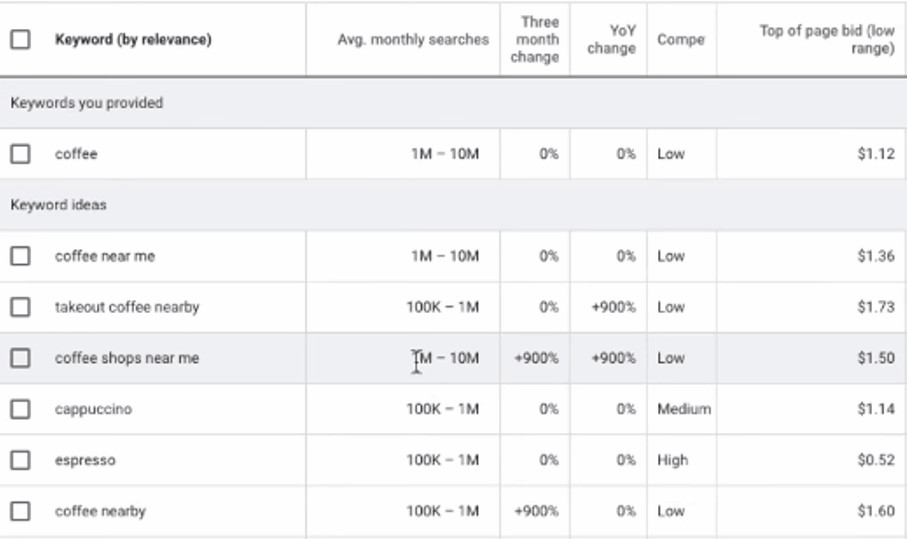
If you want to show the exact search volume, there are other tools you can use to streamline your experience with Google Keyword Planner. You can download our Keyword Everywhere extension, so you can see the average search volume of each keyword without having to launch a Google ads campaign:
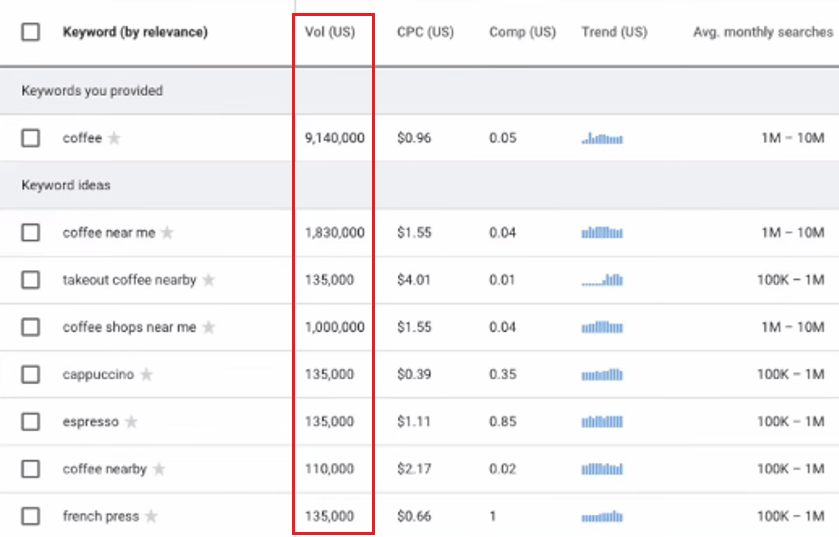
2. Google Trends
Google Trends should also be a part of this list because it allows you to explore keywords that are gaining popularity and relevance. You can type in a seed keyword, scroll towards the bottom of the results page, and see keywords tagged as “Breakout”.
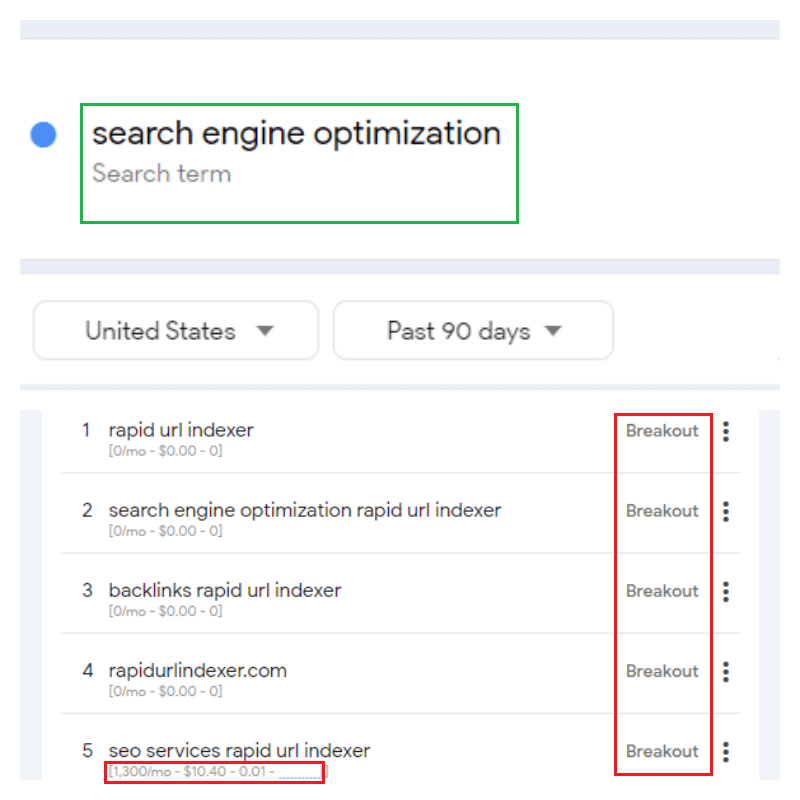
Breakout keywords are those queries whose search volume recently surged by over 5000%. They are untapped opportunities that are yet to go mainstream. In the example above, we typed in ‘search engine optimization’, and a lot of the results point to ‘rapid url indexer’ which has recently debuted its robust indexing service. Being one of the first blogs to cover the topic in an in-depth way could be a great way to rank on the first page faster.
Just take note that not all breakout keywords become consistently popular, but if you want more organic traffic, no matter how temporary, you can use Google Trends to find these promising search terms.
Google Trends doesn’t show the search volume of the keyword ideas it displays. However, as seen above, you can see keywords data below the related queries if you activate our Keywords Everywhere extension. It’s a handy Google Trends alternative to make your decision-making process more informed.
Besides finding keywords that are gaining more traction, you can also use Google Trends to verify if a keyword you want to target is consistently in demand or losing relevance.
For example, many people think that Black Hat SEO is dead, but up until now, there’s still consistent search demand month after month.
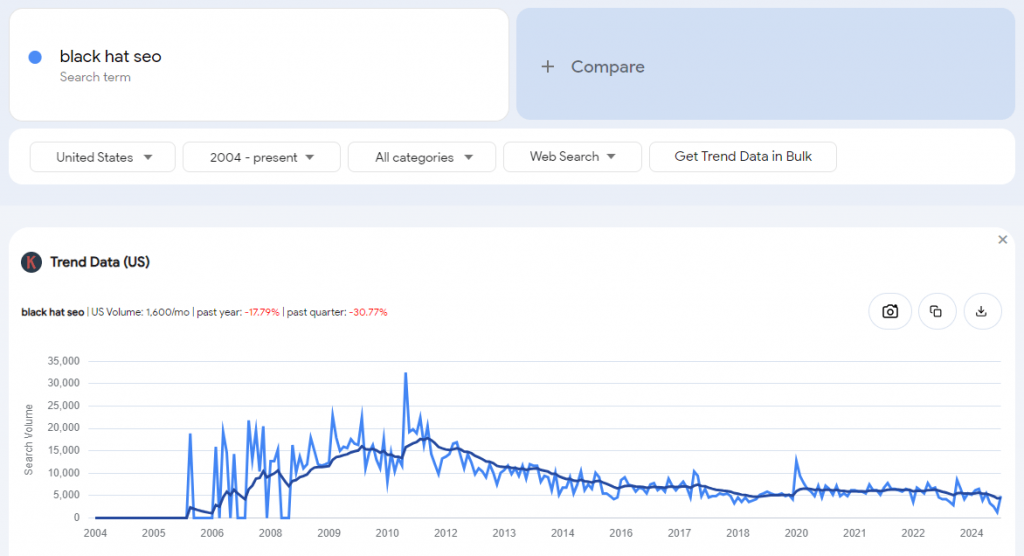
It’s no longer as popular as before because Google has gotten so much better at flagging black hat practices, but using Google Trends, you can double-check whether or not a search term is actually still being used. Another example is the term ezine, as shown below. It’s a huge trend back in the day but is no longer relevant and is even considered dead.
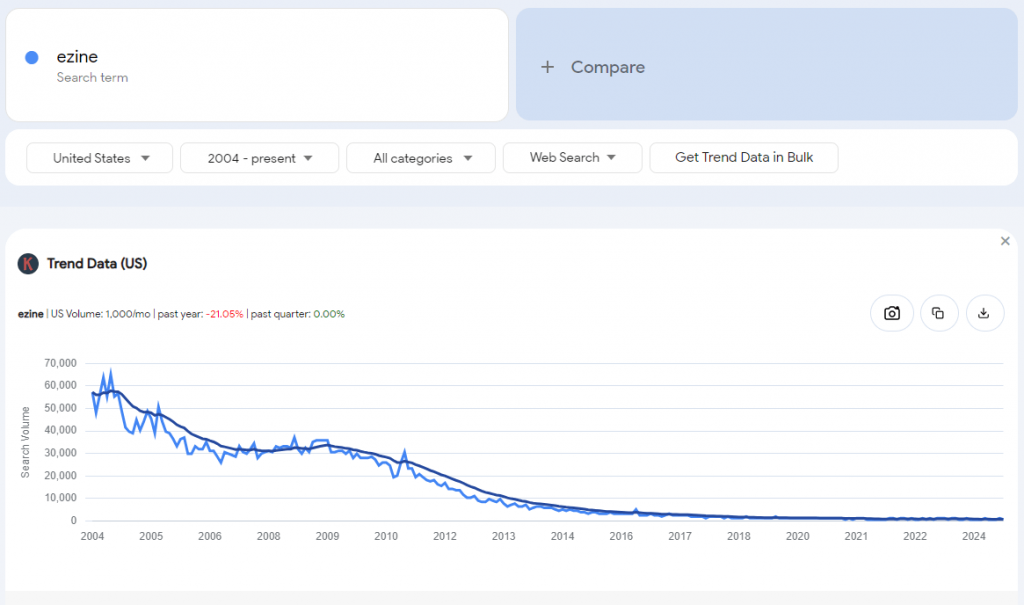
Whether you want to cover trendy topics or target evergreen content, you can use Google Trends to verify which keywords are worth your while
Also Read: How to Use Google Trends for SEO
3. Keywords Everywhere
If you’re looking for an efficient and affordable keyword research tool, our browser extension allows you to explore keywords literally everywhere! Whether you’re on Google, YouTube, Amazon, Etsy, or other major platforms, you can easily explore keywords along with their search volume, competition score, trends chart, etc.
For example, when you use Google, you can immediately see the monthly search volume and other keyword insights without having to log in to a keyword tool and switch back and forth to obtain data.
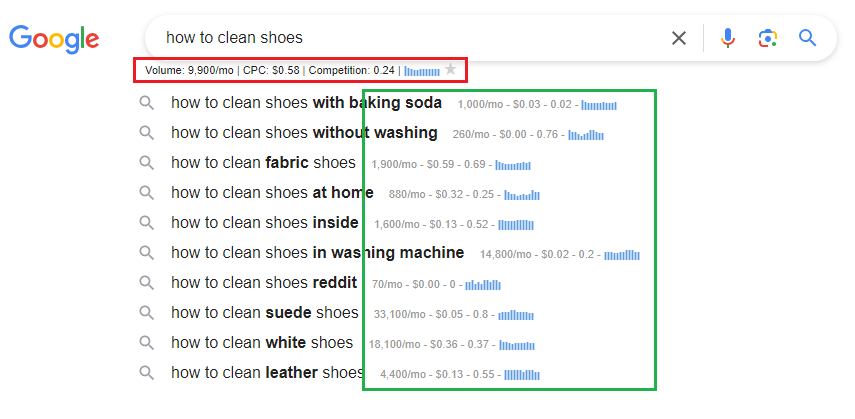
Keyword level data also instantly appears for all the auto-suggested keywords Google feeds. If you conduct keyword search on a regular basis and want to explore new keyword ideas, Keywords Everywhere makes it quick and easy to browse and work without the extra hassle. The process becomes more efficient and even enjoyable!
As you scroll down and look over to the side, you’ll see even more keyword ideas that are organized into multiple categories:
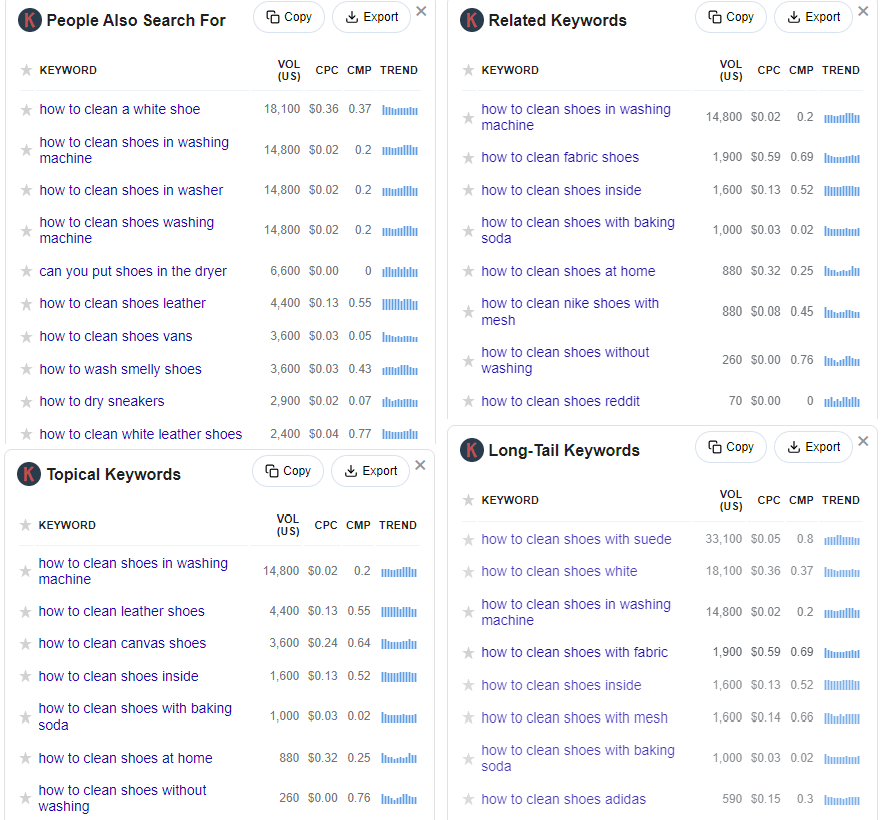
Keywords Everywhere monthly subscription starts at only $5. And as low as $7 per month, you can use Keywords Everywhere plus access to our on-page SEO analysis tool, SEO Minion. Besides generating ideas, Keywords Everywhere is also a powerful and affordable tool for doing competitor analysis.
4. Answer the Public
Answer the Public is another keyword search tool that allows you to visualize keywords in context. You can view keyword ideas via the tool’s visualization wheel:
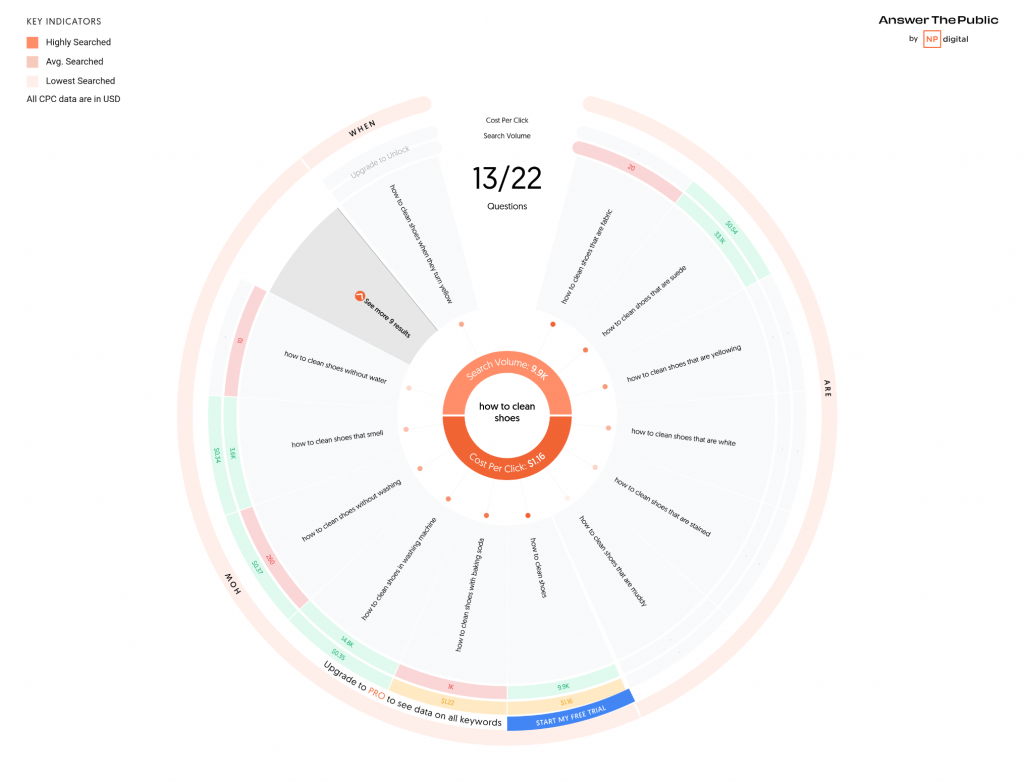
You can also view data in list or table formats. Keywords are categorized into five groups: Questions, Prepositions, Comparisons, Alphabeticals, and Related.
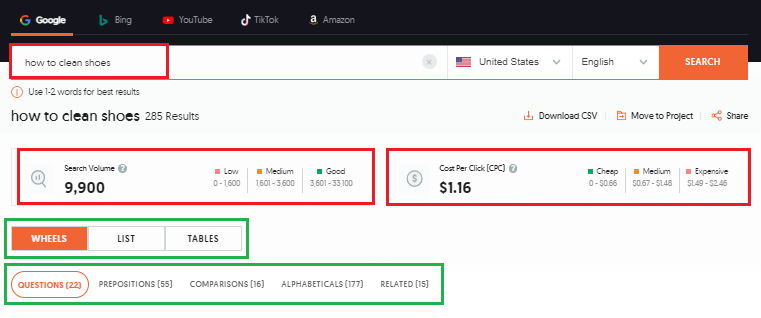
Like other tools, Answer the Public also shows you the search volume and Cost per Click and even shows a guide on which search volume ranges are good and which CPC values are cheap. Pricing starts at $5 per month.
5. Semrush
Semrush’s Keyword Magic Tool is also a popular keyword explorer that allows you to generate hundreds of keyword ideas instantly. You can apply filters as well if there are specific metrics you want to target. Like in the example below, you can set the search volume range, keyword difficulty, search intent, and more.
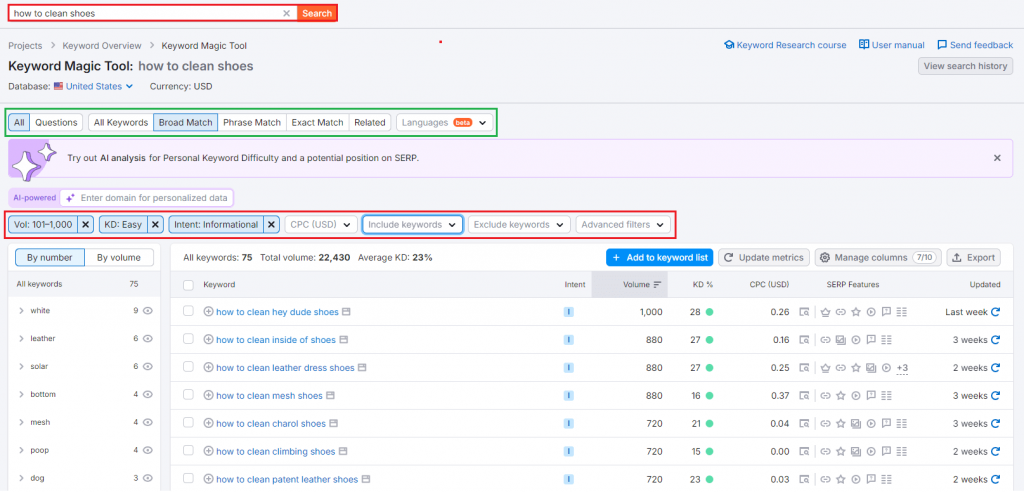
Semrush’s pricing starts at $139 per month, which can be pretty steep for total beginners, but for small teams who want to unlock other features like website audit, competitor analysis, and other advertising tools, Semrush’s Pro plan could be a good all-around tool.
6. Ahrefs
You can also use Ahrefs to explore more keywords that can drive traffic to your site. You can start with a seed keyword, but Ahrefs allows you to process up to 10 seed keywords at a time.
Like Semrush, Ahrefs has powerful filtering options though it doesn’t have the feature to classify search intent. As a backlink checker, though, it’s considered one of the most detailed and robust.
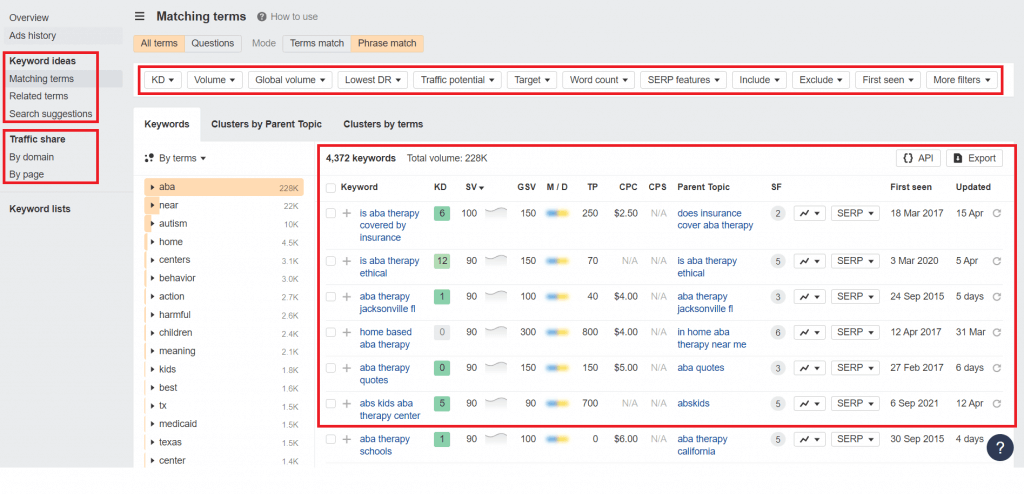
Ahref’s Lite plan is priced at $129 per month. This plan unlocks many other tools besides Keywords Explorer including Rank Tracker, Site Audit, Competitive Analysis, and more.
7. Moz
Moz offers different tools for SEO keyword research. Their Keyword Explorer has a free version for up to 10 queries a month. The paid plan starts at $49 per month which gives you access to the MozBar Premium, competitive research features, and site tracking.
Moz’s Keyword Explorer has a very straightforward interface that shows the monthly search volume, organic CTR, Keyword Difficulty, as well as the minimum DA of the sites in the top 10 results. It also shows the search intent and the SERP features on the first page of Google.
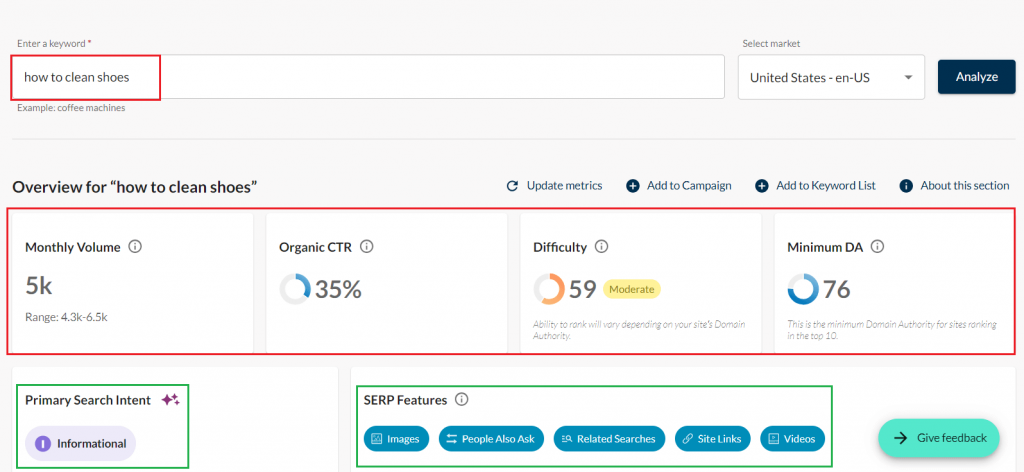
Qualities of a Good Keyword Research Tool
In essence, the best keyword research tool allows you to discover new keyword opportunities, outrank your competitors, and drive organic traffic to your site. To do this, it has to have the following features:
- The capability of finding lots of keyword ideas
- Competition analytics feature
- KD score
- Grouping/filtering features
- Accurate data and a comprehensive database
Besides keyword metrics and insights, your choice of keyword research tools also depends on how you want to enhance your workflow since personal preference and ease of use matter as well.
You also need to consider your budget. If you’re still starting out, you can use the more affordable or even free keyword research tools that can do the job and eventually try out other expensive tools as needed. As long as you can find what exactly people are typing into search engines and do a good job at helping people find what they’re looking for, you’re well on the right track.


